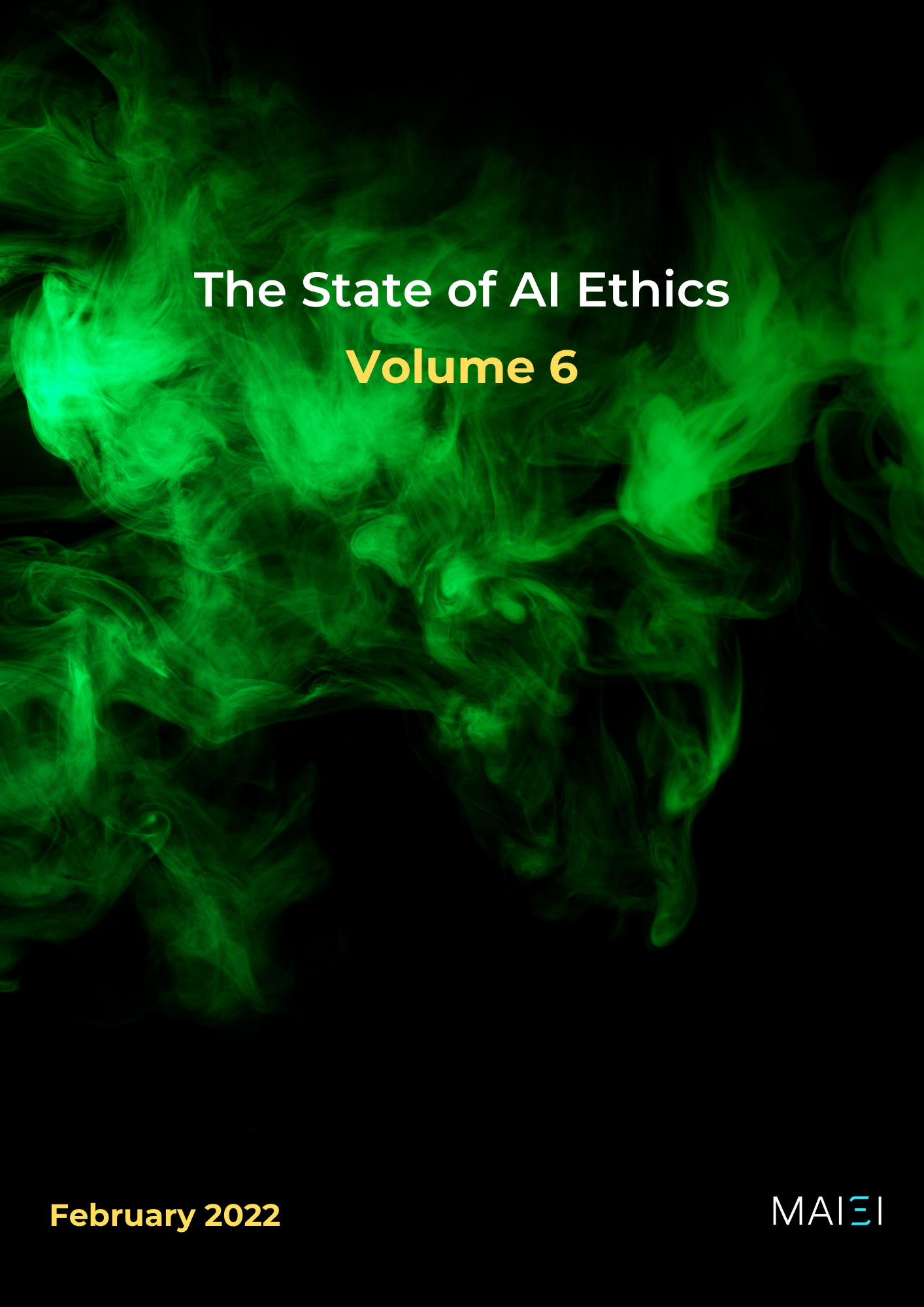
Subscribe to our weekly newsletter for the latest AI ethics research & reporting.
Welcome to 2022! (if you’re reading this report at the time of the release, or hello to you in the future!) 2021 was a year that showed us a lot of things. We came together as society to fight one of the toughest battles of our time: the COVID-19 pandemic that reshaped our world and society. Operation Warp Speed helped us get vaccines and distribution around the world worked in overdrive to bring elevated safety against this pandemic. Yet, so much more needs to be done if we’re to beat this back and go back to the world as it was before. At the same time, technological progress didn’t pause. In most cases, it accelerated. This warrants continued examination to ensure that this technology doesn’t insert itself into our society and lives in a way that is discordant with our values.
Now in its sixth cycle, this edition of the State of AI Ethics Report comes to you with a wide array of topics and contributions from leading lights in the field. For the first time, we have a Spanish text contribution in the report in our endeavor to produce multilingual content for the community to consume. We’ve added a new chapter on Trends that highlights subtle and not so subtle changes taking place in the AI ethics landscape. This one is a must-read for anyone who is planning on bring AI ethics meaningfully into their organizations, or pursuing research and looking for ideas on which areas to make an impact in.
As always, we’ve got our What we’re thinking section that brings to you original contributions and essays diving into areas like How to build an AI ethics team at your organization? to other subjects like Constructing and Deconstructing Gender with AI-generated art. We cover other ideas in this chapter detailing developments around the world such as changes in talent, funding, and ethics as AI development picks up in Vietnam. In-depth interviews with industry experts to understand what it takes to bring AI ethics effectively into an organization’s practices are supplemented by interviews with educators who are working hard to bring AI ethics education into classrooms around the world. They yield insights for anyone interested in either building training programs at a corporation or those who have students coming to them with questions about AI and want to have structured courses to guide them on this journey of building Responsible AI systems. A few other pieces make sure though that the discussions don’t just focus on principles but also practical advice such as The Proliferation of AI Ethics Principles: What’s Next? that analyzes what the gaps are between principles and practice today.
Another new addition to the report is the Analysis of the AI Ecosystem chapter that has the goal of taking a meta-level approach to understanding the dynamics at play in the field, including pieces like The Values Encoded in Machine Learning Research and Putting AI ethics to work: are the tools fit for purpose? We also cover various AI regulations that are in development around the world, looking at those coming out of the EU, US, NATO, UK, and UNESCO.
Privacy, Bias, and Social Media and Problematic Information also have a presence as chapters in this report. They continue to remain significant areas within Responsible AI and cover a lot of ground (though it is impossible to be exhaustive even in a ~300 page report). We’ve worked hard to curate those pieces that go beyond what is most often covered and pieces that we thought deserved a bit more attention for their particular lens on the issues in each of these domains.
Another new addition to this report which builds on our push towards moving from principles to practice is the chapter on AI Design and Governance which has the goal of dissecting the entire ecosystem around AI and the AI lifecycle itself to gain a very deep understanding of the choices and decisions that lead to some of the ethical issues that arise in AI. It constitutes about one-sixth of the report and is definitely something that I would encourage you to read in its entirety to gain some new perspectives on how we can actualize Responsible AI.
Given all the regulations coming out, the Laws and Regulations chapter provides a dedicated space to discuss the changes that are taking place in this landscape and will certainly provide you with markers on what to watch out for in 2022 and beyond as lawmakers and governments around the world scramble into action to regulate the relentless march of AI development and deployment.
And finally, as always we have our much-enjoyed Outside the Boxes chapter that captures eclectic developments in the field, things that might evolve into their own subfields as the years roll by. From covering things like Ubuntu ethics to animism and Rinri, you get the chance to zoom out and see the unbelievable ways that AI is impacting and transforming our society.
We’ve also got special contributions from Idoia Salazar, Michael Klenk, and Kathy Baxter providing chapter introductions. We also welcomed contributions from our network of collaborators and our thanks go out to Ramya Srinivasan, Jonas Schuett, Jimmy Huang, Robert de Neufville, Natalie Klym, Andrea Pedeferri, Andrea Owe, Nga Than, Khoa Lam, Angshuman Kaushik, Avantika Bhandari, Sarah P. Grant, Anne Boily, Philippe Dambly, Axel Beelen, Laird Gallaghar, Ravit Dotan, Sean McGregor, and Azfar Adib.
